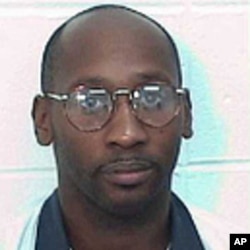U.S. death row inmate Troy Davis, who was convicted for the 1989 shooting death of a police officer, was put to death late Wednesday in the southern state of Georgia, after the Supreme Court rejected a last minute appeal to stay his execution.
Davis died by lethal injection just after 11:00 p.m. local time (EDT) as hundreds of demonstrators gathered outside to declare his innocence.
Davis died by lethal injection just after 11:00 p.m. local time (EDT) as hundreds of demonstrators gathered outside to declare his innocence.
In his final statement, witnesses said Davis told the family of slain officer, Mark MacPhail, that he "did not take their son, father, and brother," and that he did not own a gun.
The case has drawn international attention for having no physical evidence linking Davis to the crime. Seven of the nine witnesses who helped convict Davis have retracted or recanted their testimony.
The case was also racially-charged, with many critics claiming Davis, an African American, was unjustly charged for the murder of MacPhail, a white man. Davis' attorney, Thomas Ruffin, compared the execution to slavery and the lynching of African Americans.
"One thing I want to get clear is just because it was legal doesn't mean it was right. Slavery was legal, but it wasn't right. Jim Crow segregation was legal, but it wasn't right," he said. "And the killing of innocents, such as Troy Anthony Davis, however legal it may be in Georgia, however legal it may be in the eyes of the Supreme Court of the United States - this sort of legalized lynching is not right."
Davis' lawyers had filed a last-ditch appeal to the U.S. Supreme Court just minutes before the execution was originally scheduled to take place at 7:00 pm local time. The court put a temporary hold on the execution, but rejected the appeal without comment a few hours later.
His legal team unsuccessfully tried several other last-ditch measures Wednesday, including offering for the 42-year-old to take a polygraph test to prove his innocence. Prison officials turned them down.
Davis' lawyers also appealed to President Barack Obama to stop the execution, but a White House spokesman said it was "not appropriate" for the president to weigh in on specific cases.
Pope Benedict, former U.S. president Jimmy Carter, Archbishop Desmond Tutu, a former FBI director and conservative Georgia politicians are among those who have questioned Davis' guilt and advocated on his behalf. Thousands of people around the world have rallied in recent days, and millions of people signed petitions to stop Davis' execution.
Amnesty International immediately criticized Davis' execution, calling it a "catastrophic failure of the justice system."
Supporters set up a vigil across the street from the Georgia prison where Davis was being held. Activists held rallies in several cities across the United States and outside many U.S. embassies in Europe. On Twitter, the phrase "Who is Troy Davis?" is trending worldwide, with people answering the question with phrases like "A man who does NOT deserve to die."
The family of Mark MacPhail stands by the court's ruling that Davis is guilty. MacPhail's widow says Davis has had "ample time to prove his innocence."
The case has drawn international attention for having no physical evidence linking Davis to the crime. Seven of the nine witnesses who helped convict Davis have retracted or recanted their testimony.
The case was also racially-charged, with many critics claiming Davis, an African American, was unjustly charged for the murder of MacPhail, a white man. Davis' attorney, Thomas Ruffin, compared the execution to slavery and the lynching of African Americans.
"One thing I want to get clear is just because it was legal doesn't mean it was right. Slavery was legal, but it wasn't right. Jim Crow segregation was legal, but it wasn't right," he said. "And the killing of innocents, such as Troy Anthony Davis, however legal it may be in Georgia, however legal it may be in the eyes of the Supreme Court of the United States - this sort of legalized lynching is not right."
Davis' lawyers had filed a last-ditch appeal to the U.S. Supreme Court just minutes before the execution was originally scheduled to take place at 7:00 pm local time. The court put a temporary hold on the execution, but rejected the appeal without comment a few hours later.
His legal team unsuccessfully tried several other last-ditch measures Wednesday, including offering for the 42-year-old to take a polygraph test to prove his innocence. Prison officials turned them down.
Davis' lawyers also appealed to President Barack Obama to stop the execution, but a White House spokesman said it was "not appropriate" for the president to weigh in on specific cases.
Pope Benedict, former U.S. president Jimmy Carter, Archbishop Desmond Tutu, a former FBI director and conservative Georgia politicians are among those who have questioned Davis' guilt and advocated on his behalf. Thousands of people around the world have rallied in recent days, and millions of people signed petitions to stop Davis' execution.
Amnesty International immediately criticized Davis' execution, calling it a "catastrophic failure of the justice system."
Supporters set up a vigil across the street from the Georgia prison where Davis was being held. Activists held rallies in several cities across the United States and outside many U.S. embassies in Europe. On Twitter, the phrase "Who is Troy Davis?" is trending worldwide, with people answering the question with phrases like "A man who does NOT deserve to die."
The family of Mark MacPhail stands by the court's ruling that Davis is guilty. MacPhail's widow says Davis has had "ample time to prove his innocence."





